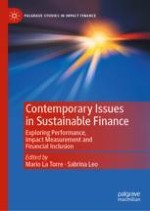2023 | OriginalPaper | Buchkapitel
3. Impact Investments Measurement: Bridging Research and Practice
verfasst von : Eugenia Strano, Alessandro Rizzello, Annarita Trotta
Erschienen in: Contemporary Issues in Sustainable Finance
Aktivieren Sie unsere intelligente Suche, um passende Fachinhalte oder Patente zu finden.
Wählen Sie Textabschnitte aus um mit Künstlicher Intelligenz passenden Patente zu finden. powered by
Markieren Sie Textabschnitte, um KI-gestützt weitere passende Inhalte zu finden. powered by
